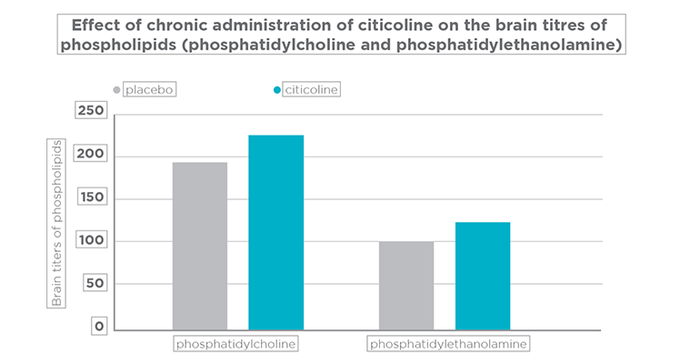Research on citicoline shows the phospholipid improves attention in middle-aged women and memory in an elderly population.
November 5, 2019

According to global market research, the market for brain health supplements was valued at $6.2 billion in 2018 and is estimated to expand at a compound annual growth rate (CAGR) of 8.2% by 2025, according to Grand View Research. In this rapidly growing market faced by significant regulatory scrutiny, it’s important for innovative developers to focus on proven, clinically validated ingredients that provide clear benefits for consumers.
While the spotlight is on the growing cognitive health market and the wide array of new product entries, citicoline has been helping to preserve and promote cognitive health around the world for decades. And nobody has done more to develop and promote citicoline than Interquim S.A., the Spanish company that developed the first oral preparation and pioneered its commercialization more than 40 years ago.
In the U.S., citicoline is a self-affirmed GRAS (generally recognized as safe) dietary ingredient. In nearly every other country around the world, it is classified as a pharmaceutical. This places citicoline in a unique position with a pharmaceutical-grade ingredient supported by more than 100 published clinical papers and the global acceptance of clinicians at all levels of care.
The brain is the command center of the nervous system and the most complex organ of the human body. It regulates and controls vital functions such as breathing, heart rate, basic functions like sleeping and eating, and superior functions including memory, language, vision and attention.
The brain is formed of specialized cells called neurons. Each neuron connects with other neurons, building up a complex neuronal network. The integrity of this network is dependent on the proper structure of neuronal membranes, and it is essential for cognition. The neuronal membrane is a semipermeable barrier formed of proteins and phospholipids. The appropriate composition of phospholipids in neuronal membranes is pivotal to ensure adequate brain functioning.
A phospholipid produced in the body, citicoline (also known as CDP-Choline or cytidine 5'-diphosphocholine) is the rate-limiting intermediate in the production of phosphatidylcholine, one of the most crucial phospholipids in the brain cell membrane.1 Citicoline also helps produce acetylcholine and activates the cholinergic system, which uses it for neuron-to-neuron signaling used in learning, memory storage and recall.2
Citicoline base vs. sodium citicoline
Citicoline is available in two forms: base and sodium salt. The first oral form, and the most widely used throughout the world, is sodium citicoline.
Sodium citicoline is the original oral form of citicoline developed by Interquim S.A., in the 1970s (available now as Xerenoos brand from Interquim S.A. and Berg Nutrition in the U.S.). It is more stable than the base form, making it the favored form for developers and formulators. It is also the most widely researched oral form of citicoline on the market, with nearly 100 published trials dating back decades and multiple use patents around the world.
One study investigating sodium citicoline’s effect on attention and mental performance in middle-aged women found that after 28 days, subjects taking 500 mg/d of citicoline demonstrated significant improvement in cognitive performance measures as compared to placebo, with the most marked improvement shown in attentional performance.3
Another study in an elderly population also found improvements in mental performance and memory. Subjects were evaluated on free recall, word recall, immediate recall and delayed recall, with the citicoline group showing marked improvement over placebo.4 The authors suggested the results may be due to citicoline’s effect on neuron regeneration and circulation within the brain.

Follow the science to successful cognitive support
As a practicing physician, I recommend citicoline to anyone seeking to preserve and improve cognitive health. My patients expect that I am fully informed and believe in the effectiveness of the products I recommend. They’ll challenge me on it, too, by doing their own research and questioning me if they doubt the integrity of the science. With citicoline, there is no such concern. With nearly 300 papers over 40-plus years, and nearly 100 on the sodium salt alone, there is no better researched, more validated, safety confirmed nootropic on the market today.
Ken Redcross, M.D., is author of “Bond: The 4 Cornerstones of a Lasting and Caring Relationship with Your Doctor,” and founder of Redcross Concierge, a personalized medical practice designed to enhance the patient-doctor relationship while providing access to a full spectrum of health care services and holistic and wellness counseling. Redcross’ patient portfolio includes executives, athletes and entertainers, as well as individuals from all walks and stages of lifeRedcross earned his medical degree from Columbia Presbyterian Medical Center in New York, specializing in internal medicine.
References
1. Secades J, Frontera G. “CDP-choline: pharmacological and clinical review.” Methods Find Exp. Clin Pharmacol. 1995 Oct;17 Suppl B:1-54.
2. Shen ZX. “Brain cholinesterases: III. Future perspectives of AD research and clinical practice.” Med Hypotheses. 2004;63(2):298-307.
3. Alvarez X et al. “Citicoline improves memory performance in elderly subjects.” Methods Find Exp Clin Pharmacol. 1997 Apr;19(3):201-10.
4. Abad-Santos F et al. “The current state of citicholine in cerebral ischemia.” Rev Neurol. 2000 Apr 1-15;30(7):663-70.
About the Author(s)
You May Also Like






.png?width=800&auto=webp&quality=80&disable=upscale)